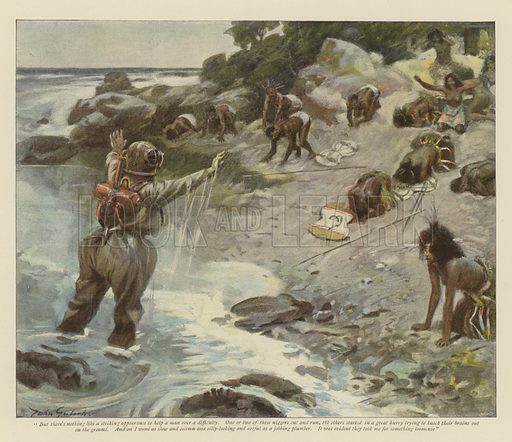“Jimmy Goggles the God”[a]“Jimmy Goggles” is a nickname given to the diving suit worn by the narrator. is a short story by the English author H. G. Wells, first published in the December 1898 edition of The GraphicBritish weekly illustrated newspaper published from 1869 to 1932. and republished in Twelve Stories and a DreamCollection of 13 short stories by H. G. Wells, first published in 1903.(1903) and The Country of the Blind and Other StoriesCollection of 33 short stories by H. G. Wells, first published in 1911. (1911). Told as a first-person narrative, the story concerns a party of treasure hunters attacked by natives off the coast of Papua, only one of whom survives, because dressed in a diving suit he is mistaken for a god.[1]
Synopsis
The narrator of the story is one of the three survivors of the Ocean Pioneer, which had sunk twenty years earlier in twenty fathoms of water carrying fifty thousand pounds’ worth of gold dust. Jacobs, the ship’s mate and another of the survivors, suggests a scheme to his companions whereby they mislead the “official” salvagers as to the location of the wreck and go back to the actual site to recover the gold for themselves.

Look and Learn
The conspirators recruit two brothers who own a boat, the Pride of Banya, and purchase a second-hand diving suit that uses compressed air instead of pumping, which they nickname Jimmy Goggles. On reaching the wreck, the narrator dons the diving suit and descends to the depths. He finds the ship and a chest containing the gold easily enough, but has insufficient air left to retrieve it, so decides to return to the surface. As he is ascending, one of the brothers – a spear through his neck and struggling with a “nigger”[b]At the time the story was written, “nigger” was a mildly derogatory term for any dark-skinned person.[2] – falls past him. When the narrator reaches the surface he sees that two canoes full of natives have attacked the Pride of Banya, and deciding that discretion is the better part of valour he dives back down to the deck of the Ocean Pioneer.
The narrator decides to make his escape by walking along the seabed, and after about ten minutes finds himself on a beach. Before he can reach the shelter of the forest, a dozen or so natives appear, but rather than attack him they fall to their knees. Then they jump up and guide him to a hut in which their idol is kept, believing the narrator to be a god. During his four-month stay he seems to bring the natives luck, but eventually he succeeds in making his escape along the coast, leaving behind his now empty diving suit.
Commentary
To a 21st-century reader, Wells’s repeated use of the word nigger to describe the Papuan natives may seem offensive, yet it was not so in Wells’s own time. At worst, it was a mildly derogatory term for any dark-skinned person.[2]
The academic Yoonjoung Choi has described “Jimmy Goggles the God” and another of Wells’s short stories, “Aepyornis IslandShort story by H. G. Wells, first published in 1894, which can be read as a Robinsonade, a parable on the theme of loneliness, or simply a ripping yarn in the manner of Rudyard Kipling.“, as introducing the “carnivalesque ‘angle’ ” that informs his major works. A parody of the epic genre, carnivalesque literature replaces the “lofty dares of gods and highborn heroes with earthbound adventures of low-class characters”, such as the “idle and fraudulent seaman” in “Jimmy Goggles the Gods”. The object of the natives’ deification is not the narrator but the eponymous diving suit, and his escape is the “decrowning of the slave king of carnival”.[3]
See also
- H. G. Wells bibliographyList of publications written by H. G. Wells during the more than fifty years of his literary career.
Notes
| a | “Jimmy Goggles” is a nickname given to the diving suit worn by the narrator. |
|---|---|
| b | At the time the story was written, “nigger” was a mildly derogatory term for any dark-skinned person.[2] |
References
Bibliography
External links
- Full text of “Jimmy Goggles the God” at Project Gutenberg
